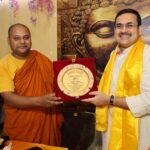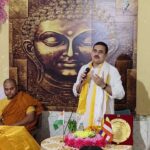All About Yoga and the Civilisational Debate
- By : Anirban Ganguly
- Category : Articles
Historian H G Rawlinson made a crucial observation in his study on Indian historical studies (1931) which not only continues to remain relevant in the current academic and civilisational discourse in India, but also seeks redress. “Under the system in vogue in most Indian universities,” observed Rawlinson, “the student knows more about Julius Caesar or the Battle of Marathon than of Chandragupta or the teaching of Gautama. We employ lecturers to instruct our pupils in western ethics but we forget to encourage them to study the admirable sermons in stone of their own emperor Asoka, written as they were for the edification of the people at large. No student should be allowed to waste his time over Greek and Roman history, while remaining ignorant of what the Greek historians and the Chinese travellers have to tell him of his own country and her past.”
It is perhaps this trait of wasting excessive time over Roman history that has led some “celebrated” Indian historians to argue that Yoga has a Greek or Roman origin or influence.
Interestingly, while some of our present day “ideologue historians” argue for a Greek origin of Yoga, the Indian or Bharatiya or Hindu or Vedic antiquity of yoga has been definitely established. For historians who seek to read and cite nothing beyond their own work and those of their ideological comrades, such findings have obviously escaped notice.
Veteran archaeologist B B Lal in his seminal work, The Sarasvati Flows On: the Continuity of Indian Culture (2002) and Michel Danino, in his exhaustive study, The Lost River: in the Trail of the Sarasvati (2010), have detailed origins of yoga and its continuum. Excavations at Harappan sites have thrown up several seals with figures seated in the “mulabandhasana”. Danino observes that “a striking example from Harappa shows a man seated cross-legged with his hands joined in the traditional Indian namaste: an av erage Indian would be hard put to decide whether it was made 4,500 years ago or yesterday!”
But our historian-eminences hardly have time or possess the talent or inclination or training to look at the world the other way round—not search for Greece in India but rather look for India in Greece.
In an interesting study inspired by such a reversal of gaze, a forgotten oriental scholar E. Pococke did just that. In his study India in Greece: Truth In Mythology (1852), Pococke argued that India had in fact heavily influenced the evolution of Greek civilisation, culture and art. He confidently asserted that he has established that the “whole of Greece, from the era of the supposed god-ships of Poseidon and Zeus, down to the close of the Trojan war, as being Indian in language, sentiment, and religion, and in the arts of peace and war.”
For various political reasons, Pococke’s political patrons suppressed the work; it would certainly not serve their political strategy to generate a debate on the possibilities of a reverse colonisation.
Whether Pococke eventually succeeded in establishing his claim, or whether his historical study held ground is still open to debate, the circulation of his work would have undoubtedly been among the triggers that could have inspired us to reverse our gaze rather than imitate and regurgitate a certain line that only furthered theories of the mission-civilisatrice.
We were ready to, as Sri Aurobindo caustically noted, “make ourselves a sort of brown Englishmen, to throw our ancient culture into the dust-bin and put on the livery or uniform of the West”.
The International Yoga Day on June 21 is an occasion to engage in a civilisational debate on India’s contributions to the world and, more importantly, to throw off that shackling livery.

















